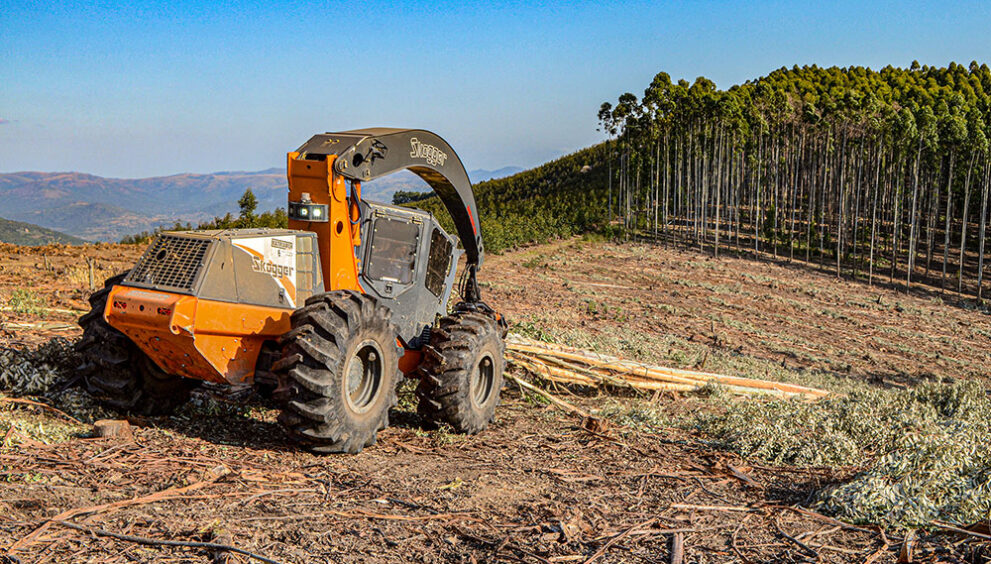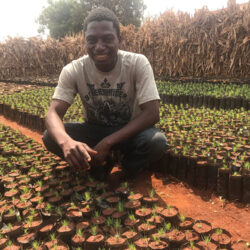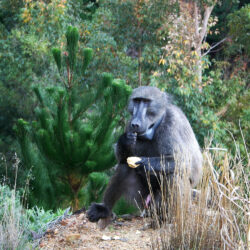A cash loan from a friend enabled Cedusizi Dlamini to start his own forestry harvesting business, which he has built up gradually through hard work and by acquiring the right equipment with the right backup to boost his productivity.
“The day I left school in 2007 I joined my brother, Thulani Khumalo, who worked as a supervisor for a forestry company here in Eswatini, in the forest working as a general labourer,” Cedusizi remembers. “This taught me a lot and I learnt about hard work before embarking on tertiary study in electrical engineering a year later.”
Cedusizi qualified as an electrical and electronics engineer from the Eswatini College of Technology in 2012.
In his first permanent job after graduating he worked as an office clerk for six months before his employer realised that, given his previous experience in forestry, Cedusizi was being under-utilised. He was then appointed operations manager for the company’s silviculture division where he stayed for three years.
“While serving this company I learnt a lot about hard work, managing money and importantly, what makes a forestry business successful,” said Cedusizi.
“After those three valuable years, I joined a silviculture contractor for a year at Usutu Forests,” Cedusizi continues. “It was around this time that I put into place plans to create my own company. Stephan Olivier, the Project Manager for Peak Timbers Limited at that time, gave me that opportunity when he tasked me to salvage all timber left over from a devastating fire that swept through the Piggs Peak area in 2016.”
Cedusizi Dlamini (left), owner of Top Technics, with Charlie Boucher, CSC Manager of Bell Equipment Swaziland.
But employing 15 forest workers made demands on Cedusizi’s cash flow that he didn’t have the resources to meet, and he was soon faced with a financial crisis. Then the brother of a good friend looked at his business plan, cash flow predictions and general enthusiasm and decided after much discussion to loan him the money he needed for start-up. However the loan had to be paid back within 12 months, which was the duration of his first probationary contract, which was a tough ask.
“I managed to pay back that loan over 12 months in 2018 and then had the benefit of a positive credit score with the bank, which would stand me in good stead going forward,” said Cedusizi. “By 2019, I started the process to buy my first new Bell 225F Logger from Bell Equipment in Eswatini, which turned out to be the first machine of the new Bell F-series logger range in the Piggs Peak area.
“I chose a Bell Logger because that is the only logger you see offering sustained service in our forests all over Eswatini. They just never seem to have an end and there are some very old machines around as well, which says a lot for the brand.”
In 2020, he bought a Bell 225A Logger on the pre-owned market that had worked for 8 000 hours, feeling confident that should that machine need a further overhaul, it would be possible due to its sturdy design that made this feasible. This machine was followed six months later by another new Bell 225F Logger.
After the burnt timber salvaging contract was completed, Top Technics secured a proper harvesting contract working in Eucalyptus when new owners took control of the timber plantations in that area. Having a longer contract in place made it possible for Cedusizi to plan properly for capital expenditure.
During 2021 Cedusizi expanded his fleet of timber handling machines when he bought a third new Bell 225F Logger and a Matriarch Skogger from Bell Equipmant, after securing a contract that demanded increased production.
Bell logger doing the hard work for Cedusizi Dlamini’s harvesting business in Eswatini.
“We generally harvest and extract during daylight hours only,” Cedusizi explains. “We have six chainsaw teams felling the Eucalyptus trees and the Matriarch Skogger then extracts these full tree lengths to a roadside depot. Here a Bell Logger will be used to arrange these full tree lengths that are cross-cut to a variety of lengths, depending on the order and these vary from 2,4 metres to 14 metres. The Bell Logger then sorts and stacks the cut timber according to their lengths.”
Cedusizi is full of praise for the difference the Matriarch Skogger has made to his operations. “I’m grateful to Charlie Boucher of Bell Equipment in Matsapha for the valuable advice he gave me around the benefits of owning a Matriarch Skogger, especially from a safety point of view, a subject we take seriously,” he adds. “Processing at roadside, where there is enough space to work safely, is now possible because of the Skogger’s ability to extract the full tree lengths.”
Cedusizi is considering adding a winch to the front of the Matriarch Skogger for use in the steeper compartments that they encounter in the Piggs Peak area.
Although his fuel credit limits stipulate a maximum daily fuel consumption, neither the Bell 225F Loggers at 7 litres/hour nor the Matriarch Skogger at 7,5 litres/hour exceed this limit.
“It’s reassuring to know that one can rely on Bell Equipment, which is not far away, for technical backup and servicing with a good parts holding,” Cedusizi says. “With the level of service that we get from Bell Equipment, I feel as if the mechanics, Russell Myburg and Christos Ginn, have been allocated to us exclusively.”
The next piece of equipment Cedusizi plans to buy will be a 13-ton Excavator with a harvesting head and he is taking a keen interest in the Kobelco SK135SR Excavator as a carrier. He also currently runs a used skidder and a 35-ton rigid timber truck which is used for transporting timber to mills and end users.




